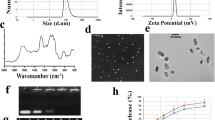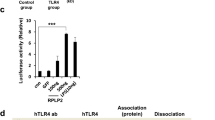Abstract
Purpose
Dendritic cell (DC)-based cancer vaccines are currently being evaluated as novel anti-tumor vaccination strategies, but in some cases, they are demonstrated to have poor clinical efficacies than anticipated. A potential reason is immune tolerance due to the immunosuppressive enzyme, indoleamine-pyrrole 2,3-dioxygenase (IDO). The aim of this study was to determine whether blocking the activity of IDO might improve the anti-tumor efficacy of DC/Lewis lung carcinoma (LLC) fusion vaccine applied to the mouse LLC model.
Methods
To prepare the DC/LLC fusion vaccine, DCs were fused with LLC using polyethylene glycol (PEG) as described. The IDO expression in the DC/LLC fusion vaccine and in the vaccinated mice was detected by western blot (WB) and/or immunohistochemical (IHC) analysis. This fusion vaccine, as a single agent or in combination with 1-methyl-tryptophan (1-MT, an IDO inhibitor), was administered to LLC mice. The anti-tumor efficacy in different treatment was determined by regular observation of tumor development and the level of splenic cytotoxic T lymphocyte (CTL) response, which was examined by lactate dehydrogenase (LDH) release.
Results
In the LLC mice, we observed that IDO-positive cells were extensively accumulated in tumor draining lymph nodes (TDLNs). Furthermore, WB and IHC analysis results showed that vaccination with fusion DC/LLC cells alone caused significant up-regulation of IDO in spleens. 1-MT enhanced the anti-tumor efficacy elicited by DC/LLC fusion vaccine via delaying the tumor development and inducing stronger splenic CTL responses.
Conclusions
Our results indicate an IDO-mediated immunosuppressive mechanism might be involved in weakening the anti-tumor efficacy elicited by DC/LLC fusion vaccine, and specific inhibition of IDO activity might be required for development of cancer vaccines.






Similar content being viewed by others
References
Banchereau J, Steinman RM (1998) Dendritic cells and the control of immunity. Nature 392:245–252
Basu GD, Tinder TL, Bradley JM, Tu T, Hattrup CL, Pockaj BA, Mukherjee P (2006) Cyclooxygenase-2 inhibitor enhances the efficacy of a breast cancer vaccine: role of IDO. J Immunol 177:2391–2402
Breckpot K, Heirman C, De Greef C, van der Bruggen P, Thielemans K (2004) Identification of new antigenic peptide presented by HLA-Cw7 and encoded by several MAGE genes using dendritic cells transduced with lentiviruses. J Immunol 172:2232–2237
Chouaib S, Asselin PC, Mami CF, Caignard A, Blay JY (1997) The host-tumor immune conflict: from immunosuppression to resistance and destruction. Immunol Today 18:493–497
Du J, Cai SH, Shi Z, Nagase F (2004) Binding activity of H-Ras is necessary for in vivo inhibition of ASK1 activity. Cell Res 14:148–154
Fallarino F, Grohmann U, Hwang KW, Orabona C, Vacca C, Bianchi R, Belladonna ML, Fioretti MC, Alegre ML, Puccetti P (2003) Modulation of tryptophan catabolism by regulatory T cells. Nat Immunol 4:1206–1212
Friberg M, Jennings R, Alsarraj M, Dessureault S, Cantor Alan, Extermann M, Mellor AL, Munn DH, Antonia SJ (2002) Indoleamine 2,3-dioxygenase contributes to tumor cell evasion of T cell-mediated rejection. Int J Cancer 101:151–155
Frumento G, Rotondo R, Tonetti M, Ferrara GB (2001) T cell proliferation is blocked by indoleamine 2,3-dioxygenase. Transplant Proc 33:428–430
Gajewski TF, Meng Y, Harlin H (2006) Immune suppression in the tumor microenvironment. J Immunother 29:233–240
Gurtner GJ, Newberry RD Schloemann SR, McDonald KG, Stenson WF (2003) Inhibition of indoleamine 2,3-dioxygenase augments trinitrobenzene sulfonic acid colitis in mice. Gastroenterology 125:1762–1773
Hatakeyama N, Tamura Y, Sahara H, Suzuki N, Suzuki K, Hori T, Mizue N, Torigoe T, Tsutsumi H, Sato N (2006) Induction of autologous CD4- and CD8-mediated T-cell responses against acute lymphocytic leukemia cell line using apoptotic tumor cell-loaded dendritic cells. Exp Hematol 34:197–207
Hayashi T, Beck L, Rossetto C, Gong X, Takikawa O, Takabayashi K, Broide DH, Carson DA, Raz E (2004) Inhibition of experimental asthma by indoleamine 2,3-dioxygenase. J Clin Invest 114:270–279
Hwu P, Du MX, Lapointe R, Do M, Taylor MW, Young HA (2000) Indoleamine 2,3-dioxygenase production by human dendritic cells results in the inhibition of T cell proliferation. J Immunol 164:3596–3599
Jantscheff P, Spagnoli G, Zajac P, Rochlitz CF (2002) Cell fusion: an approach to generating constitutively proliferating human tumor antigen-presenting cells. Cancer Immunol Immunother 51:367–375
Kao JY, Gong Y, Chen CM, Zheng QD, Chen JJ (2003) Tumor derived TGF-beta reduces the efficacy of dendritic cell/tumor fusion vaccine. J Immunol 170:3806–3811
Kirk CJ, Hartigan O’CD, Nickoloff BJ, Chamberlain JS, Giedlin M, Aukerman L, Mule JJ (2001) T cell dependent anti tumor immunity mediated by secondary lymphoid tissue chemokine: augmentation of dendritic cell based immunotherapy. Cancer Res 61:2062–2070
Kono K, Takahashi A, Sugai H, Fujii H, Choudhury AR, Kiessling R, Matsumoto Y (2002) Dendritic cells pulsed with HER-2/neuderived peptides can induce specific T-cell responses in patients with gastric cancer. Clin Cancer Res 8:3394–3400
Lee SP (2002) Nasopharyngeal carcinoma and the EBV-specific T cell response: prospects for immunotherapy. Semin Cancer Biol 12:463–71
Mellor AL, Munn DH (2000) Immunology at the maternal–fetal interface: lessons for T cell tolerance and suppression. Annu Rev Immunol 18:367–391
Mellor AL, Sivakumar J, Chandler P, Smith K, Molina H, Mao D , Munn DH (2001) Prevention of T cell-driven complement activation and inflammation by tryptophan catabolism during pregnancy. Nat Immunol 2:64–68
Mellor AL, Keskin DB, Johnson T, Chandler P, Munn DH (2002) Cells expressing indoleamine 2,3-dioxygenase inhibit T cell responses. J Immunol 168:3771–3776
Mellor AL, Baban B, Chandler PR, Manlapat A, Kahler DJ, Munn DH (2005) Cutting Edge: CpG Oligonucleotides induce splenic CD19+ dendritic cells to acquire potent indoleamine 2,3-dioxygenase-dependent T cell regulatory functions via IFN type 1 signaling. J Immunol 175:5601–5605
Mukherjee P, Tinder TL, Basu GD, Pathangey LB, Chen L, Gendler SJ (2004) Therapeutic efficacy of MUC1-specific cytotoxic T lymphocytes and CD137 co-stimulation in a spontaneous breast cancer model. Breast Dis 20:53–63
Muller AJ, Duhadaway JB, Donover PS, SutantoWE, Prendergast GC (2005a) Inhibition of indoleamine 2, 3-dioxygenase, an immunoregulatory target of the cancer suppression gene Bin1, potentiates cancer chemotherapy. Nat Med 11:312–319
Muller AJ, Malachowski WP, Prendergast GC (2005b) Indoleamine 2,3-dioxygenase in cancer: targeting pathological immune tolerance with small-molecule inhibitors. Expert Opin Ther Targets 9:831–849
Munn DH (2006) Indoleamine 2,3-dioxygenase, tumor-induced tolerance and counter-regulation. Curr Opin Immunol 18:220–225
Munn DH, Mellor AL (2004) IDO and tolerance to tumors. Trends Mol 10:15–18
Munn DH, Zhou M, Attwood JT, Bondarev I, Conway SJ, Marshall B, Brown C, Mellor AL (1998) Prevention of allogeneic fetal rejection by tryptophan catabolism. Science 281:1191–1193
Nam KO, Kang WJ, Kwon BS, Kim SJ, Lee HW (2005) The therapeutic potential of 4-1BB (CD137) in cancer. Curr Cancer Drug Targets 5:357–363
Okada N, Iiyama S, Okada Y, Mizuguchi H, Hayakawa T, Nakagawa S, Mayumi T, Fujita T, Yamamoto A (2005) Immunological properties and vaccine efficacy of murine dendritic cells simultaneously expressing melanoma-associated antigen and interleukin-12. Cancer Gene Ther 12:72–83
Rosenberg SA, Yang JC, Restifo NP (2004) Cancer immunotherapy: moving beyond current vaccines. Nat Med 10:909–15
Seo SK, Choi JH, Kim YH, Kang WJ, Park HY, Suh JH, Choi BK, Vinay DS, Kwon BS (2004) 4-1BB-mediated immunotherapy of rheumatoid arthritis. Nat Med 10:1088–1094
Shibata S, Okano S, Yonemitsu Y, Onimaru M, Sata S, Nagata T H, Inoue M, Zhu T, Hasegawa M, Moroi Y, Furue M, Sueishi K (2006) Induction of efficient antitumor immunity using dendritic cells activated by recombinant sendai virus and its modulation by exogenous IFN-β gene. J Immunol 177:3564–3576
Shurin MR (1996) Dendritic cells presenting tumor antigen. Cancer Immunol Immunother 43:158–164
Siders WM, Vergilis KL, Johnson C, Shields J, Kaplan JM (2003) Induction of specific antitumor immunity in the mouse with the electrofusion product of tumor cells and dendritic cells. Mol Ther 7:498–505
Speiser DE, Lienard D, Rufer N, Rubio-Godoy V, Rimoldi D, Lejeune F, Krieg AM, Cerottini JC, Romero P (2005) Rapid and strong human CD8+ T cell responses to vaccination with peptide, IFA, and CpG oligodeoxynucleotide 7909. J Clin Invest 115:739–746
Spiotto MT, Yu P, Rowley DA, Nishimura MI, Meredith SC, Gajewski TF, Fu YX, Schreiber H (2002) Increasing tumor antigen expression overcomes ‘‘ignorance’’ to solid tumors via cross presentation by bone marrow-derived stromal cells. Immunity 17:737–747
Steinbrink K, Jonuleit H, Muller G, Schuler G, Knop J, Enk AH (1999) Interleukin-10-treated human dendritic cells induce a melanoma-antigen-anergy in CD8(+) T cells resulting in a failure to lyse tumour cells. Blood 93:1634–1642
Takikawa O, Yoshida R, Kido R, Hayaishi O (1986) Tryptophan degradation in mice initiated by indoleamine 2,3-dioxygenase. J Biol Chem 261:3648–3653
Taylor MW, Feng G (1991) Relationship between interferon-γ, indoleamine 2,3-dioxygenase, and tryptophan catabolism. FASEB J 5:2516–2522
Uyttenhove C, Pilotte L, Theate I, Stroobant V, Colau D, Parmentier N, Boon T, Van den Eynde BJ (2003) Evidence for a tumoral immune resistance mechanism based on tryptophan degradation by indoleamine 2,3-dioxygenase. Nat Med 9:1269–1274
Vermij P, Frei M (2004) Halted trial renews questions about cancer vaccines. Nat Med 10:3
Wan Y, Emtage P, Zhu Q, Foley R, Pilon A, Roberts B, Gauldie J (1999) Enhanced immune response to the melanoma antigen gp100 using recombinant adenovirus-transduced dendritic cells. Cell Immunol 198:131–138
Wang J, Saffold S, Cao X, Krauss J, Chen W (1998) Eliciting T cell immunity against poorly immunogenic tumors by immunization with dendritic cell-tumor fusion vaccines. J Immunol 161:5516–5524
Wobser M, Voigt H, Houben R, Eggert AO, Freiwald M, Kaemmerer U, Kaempgen E, Schrama D, Becker JC (2007) Dendritic cell based antitumor vaccination: impact of functional indoleamine 2,3-dioxygenase expression. Cancer Immunol Immunother 56:1017–24
Xia D, Chan T, Xiang J (2005) Dendritic cell/myeloma hybrid vaccine. Methods Mol Med 113:225–233
Acknowledgments
This work was supported by National Natural Science Foundation in China (No. NSFC-30471978, and No. NSFC-30672510) and Natural Scientific Foundation of Guangdong Province (Grant code: 5001771).
Author information
Authors and Affiliations
Corresponding author
Rights and permissions
About this article
Cite this article
Ou, X., Cai, S., Liu, P. et al. Enhancement of dendritic cell-tumor fusion vaccine potency by indoleamine-pyrrole 2,3-dioxygenase inhibitor, 1-MT. J Cancer Res Clin Oncol 134, 525–533 (2008). https://doi.org/10.1007/s00432-007-0315-9
Received:
Accepted:
Published:
Issue Date:
DOI: https://doi.org/10.1007/s00432-007-0315-9




